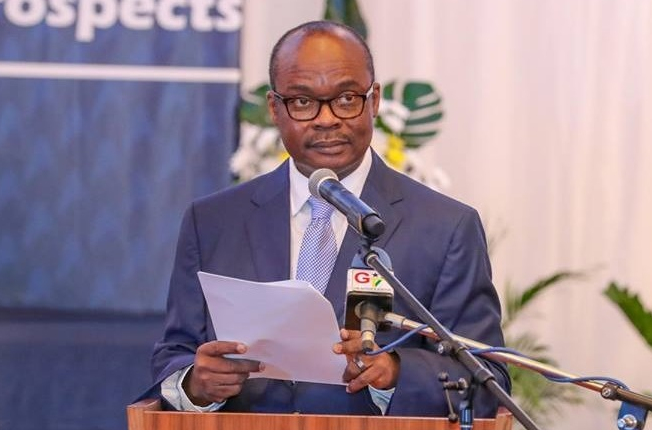Governor of the Bank of Ghana, Dr. Ernest Addison has reiterated that depositors of all the nine collapsed banks in the country have been paid their locked-up funds.
Speaking at a meeting with President Nana Akufo-Addo during the President’s working visit to the Central Bank on Tuesday, 25 August 2020, Dr Addison said: “We had the [banking sector] reform in two phases. The first phase had to do with the banking system where we revoked the licenses of the banks. Depositors got their monies.”
“The second phase of payment has to do with the SDIs – Savings and Loans and Microfinance Institutions and in their case, more than 95 percent of depositors have been paid so there is just about 5 percent of depositors who have not been paid,” he added.
Some nine local banks, 23 savings & loans companies, 347 microfinance institutions, 39 finance houses and 53 fund management companies have been closed down since 2017 under President Nana Akufo-Addo.
Vice President Dr Mahamudu Bawumia speaking about the banking crisis said in an interview on Accra-based Peace FM said: “There were such bad practices of governance in the management of these institutions and we had to step in because most of them, some of the banks were set up without any capital; they just lied their way to setting up a bank; they moved money here, showed it to the central bank, the central bank gave them the licence then they moved the money out and they were using central bank liquidity support for other purposes rather than reviving these banks, so, by the time we got into office, things were really unravelling and the new management of the central bank decided to rescue because we were really on the brink of collapsing and, so, they had to move quickly to rescue the financial sector and that is why they revoked the licences of about nine banks or so and 23 savings & loans and over 300 microfinance institutions and that act is one of the most important acts that have been done to save our economy”.
Dr Bawumia said but for the BoG’s intervention, the deposits of millions of people and institutions would have been gone with the wind.
“You had 4.6 million depositors whose monies were at stake. Can you imagine that these 4.6 million depositors will lose their monies completely like depositors of the 82 financial institutions that had collapsed, who were not paid. We were on the brink of losing the deposits of 4.6 million people.
“That is why the rescue plan was implemented and you had to essentially rationalise the banking system and make sure that the deposits were saved.
“And, so, those deposits were saved. At the end of the day, the government has had to expend close to GHS21 billion in the financial sector to save these deposits. It was [that bad]. When I saw the numbers at the time, it was quite frightening”, the Vice President said.
Asked if there was no other way the banks could have been save, Dr Bawumia said: “It doesn’t make sense because we were trying to handle it, that was how it was being done before as a country, they were being given liquidity support to try to keep them afloat but it wasn’t being used for the right purpose and when you have people who have mismanaged banks and they don’t have the capital and they’ve missed all the supervisory regulatory ratios that are required, it’s not new that you close the banks but you make sure customers’ depositors are safe, so, you move them, in this case they moved them to GCB and CBG”.
Concerning the Bank of Ghana’s role in the collapse of the banks, Dr Bawumia said: “I think there’ve been some reforms at the Bank of Ghana as a result and I think that they have been very very strong in looking at the whole financial sector, putting in certain governance protocols so that what happened wouldn’t happen again”.
“That is what the Bank of Ghana has done, both internally and externally, but you’re right that some of the blame has to be at the feet of the bank [BoG], in terms of our supervisory oversight and then you are also dealing with the situation of the banks themselves, who were, to a large extent, presenting very false and misleading reports to the central bank about the state of their data, their financial records as we’ve seen”, he said.
Source:myashhfmonline.com





